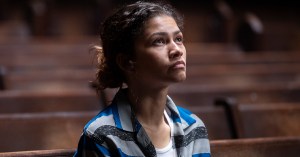10 Questions Star Wars: The Rise of Skywalker Must Answer
From the fate of Carrie Fisher's Leia to the truth behind Supreme Leader Snoke, Rey's origins, and – ugh – midichlorians, here's what we want to know.
With Star Wars: The Rise of Skywalker touted as the conclusion of the Skywalker Saga, it has more to do than typical trilogy-wrapping films like The Lord of the Rings: The Return of the King, The Matrix Revolutions, or, indeed, Return of the Jedi. It is designed to be the culmination of a nine-part saga told across 40+ years and has a lot to accomplish in less than 180 minutes. Even LOTR author J.R.R. Tolkien would sweat at this writing prompt.
Nonetheless, there are questions the film definitely needs to answer, even if only in a glib way, before the curtain falls on the Skywalkers and their role in galactic affairs. The following are the 10 questions we think the The Rise of Skywalker must answer.
Who Are Rey’s Parents?

(Photo by Walt Disney Studios)
We’ll be honest, we really like the idea that Rey (Daisy Ridley) comes from nowhere. The Star Wars galaxy gets a little too small sometimes and you need an outlier to shake things up. That was the solution seemingly given to us by Kylo Ren (Adam Driver) and Rey in Star Wars: The Last Jedi, and it is perfectly satisfactory. Unless, of course, you consider the way Rise of Skywalker director J.J. Abrams set up the issue of her parents in Star Wars: The Force Awakens. It requires some sort of resolution, even if it’s just an independent confirmation that her parents were, in fact, dirt farmers who sold her to Unkar Plutt (Simon Pegg) for beer money.
Did Palpatine Will Anakin Into Existence?

(Photo by TM and ©copyright Twentieth Century-Fox Film Corporation. All rights reserved courtesy Everett Collection)
In one of Star Wars: Episode III – Revenge of the Sith’s best scenes, Sheev Palpatine (Ian McDiarmid) suggests to the audience that he learned a way to force the midichlorians to create life. By implication, he is Anakin Skywalker’s (Hayden Christensen) father. Well, from a certain point of view, anyway. Was he really that skilled in Sith powers? Or was it all a happy accident he used to his advantage? Considering Anakin was central to his scheme, greater clarity about his birth may be in the offing. Granted, answering this question means confronting the existence of midichlorians, something a lot of Star Wars fans would rather avoid.
Who are Finn’s Kin?

(Photo by Walt Disney Studios)
Perhaps more interesting than Rey’s parents is the lost heritage of former First Order stormtrooper FN-2187 (John Boyega), A.K.A. Finn. Press-ganged into service as a child, there is a lot of unacknowledged terror in Finn’s past, but there’s also a lost world he might call home and a family he has never known. Considering The Force Awakens and The Last Jedi saw him running from things, maybe The Rise of Skywalker will offer him the chance to run toward something – the kin the First Order stole from him. And like our preferred answer for Rey’s ancestry, we’d like Finn to derive from a world and bloodline heretofore unseen.
Was This Palpatine’s Plan All Along?

As Emperor, Palpatine reached his zenith with the completion of the first Death Star, even if that apex of power was short lived. But even into his arrival in the Endor system during Return of the Jedi, he believed everything was proceeding as he had foreseen. We’re disinclined to believe his powers of prognostication were that absolute. For one thing: would he really allow himself to appear defeated for 30 years and allow a New Republic to establish itself? One imagines he will have the chance to explain his long absence in The Rise of Skywalker, and the true shape of his plan is something he might finally reveal.
Will Leia Survive?

(Photo by Walt Disney Studios)
Because of Carrie Fisher’s untimely death in 2016, this question is more of a minefield than it would otherwise be. Had she lived, Episode IX was to be her movie, much the same way The Force Awakens was Han’s (Harrison Ford) film and The Last Jedi was about Luke (Mark Hamill). And in that paradigm, we would expect her to sacrifice herself for the good of the next generation like her brother and her child’s father. But now, it’s all different. There are pros and cons to both killing Leia off and letting her survive into the last iris-out. Hopefully, it will be satisfying either way.
Can The Republic Ever Be Restored?

(Photo by Walt Disney Studios)
This is one of the bigger-level questions Star Wars movies may not be equipped to answer. The sequels showed us a Republic so corrupt that Palpatine could use a meaningless trade dispute to slip into power. The sequel trilogy has revealed a New Republic so tolerant of wannabe Imperials that it led to the Republic’s destruction. Both were wiped away by more aggressive forces. Can the Resistance prove to be better at restoring government than the Rebel Alliance? This may be a question for tie-in novels after the film’s release, but it has to give us some inkling Poe (Oscar Isaac), Rose (Kelly Marie Tran), and the others can do better.
What The Poodoo Was The Real Prophecy?

(Photo by TM and ©copyright Twentieth Century-Fox Film Corporation. All rights reserved courtesy Everett Collection)
In our recent rewatch of the prequels, we were struck by how ill-defined the prophecy really is. When it is confronted directly, we’re only told a chosen one will emerge to bring balance to the Force — but the actual wording of this prophecy is nowhere to be found in the films. Now, there is something poetic about the Jedi failing to see it as a warning, but it is never framed as such in Episodes I-III. Was it a textual hand grenade left in the Jedi library by an older Sith Lord, or was it something Palpatine himself planted? He was fond of using the truth as a weapon and skilled at obscuring his presence from the Jedi.
Who Was Snoke?

(Photo by Walt Disney Studios)
The two halves of his corpse may still be rotting aboard his broken and abandoned Star Destroyer, but Snoke’s (Andy Serkis) identity finally matters now that Palpatine is back in the picture. Was he the last surviving Inquisitor? A cover identity for the disembodied Palpatine? Or just a hapless Force-sensitive seduced by the Dark Side? Like some of the other questions we need answered, this one just needs a brief word from Darth Sidious about his role in the formation of the First Order, but even in that brevity, he needs to slot into place.
Are The Jedi Worth Saving?

(Photo by Walt Disney Studios)
This is another philosophical question the movie may not have the bandwidth to address, but considering the scenes of Rey training in the Jedi arts featured in trailers and commercials, we have to ask if the Jedi are worth saving. True, The Last Jedi ultimately makes a case for their restoration, but it was the rigidity of their philosophy that led the galaxy to Sith rule. Players of the Star Wars: Knights of the Old Republic games will recognize this question, as it lurks at the heart of its narrative, but it also seems to matter here, as Rey holds the future of Force-wielding in the Galaxy. Like the others in the Resistance, can she do better?
Outside of the film, there are big financial reasons for the Jedi to be restored past the Skywalker Saga — at least a few people have not made their own saber at Star Wars: Galaxy’s Edge — but the soul of the order is as important to the overall saga as Anakin’s soul. And for that reason, Rey must make a definitive choice.
When Will We See Episode X?

(Photo by TM and ©copyright Twentieth Century-Fox Film Corporation. All rights reserved courtesy Everett Collection)
Long, long ago, Star Wars creator George Lucas let slip an initial plan for the series to be 12 parts. At the time, it was envisioned as more of a James Bond-style serial with fewer overarching plots. When the ongoing plot became important, he revised this number to nine (and then to six during the prequel era). We fully expect this original plan to be Lucasfilm’s excuse when Episodes X-XII inevitably happen. But how long will we have to wait? It’s a question The Rise of Skywalker can actually answer if it gives the audiences an authentic and complete ending.
And the chances of that happening are about as good as Palpatine meeting his true, final fate.
Star Wars: The Rise of Skywalker opens on December 20.





